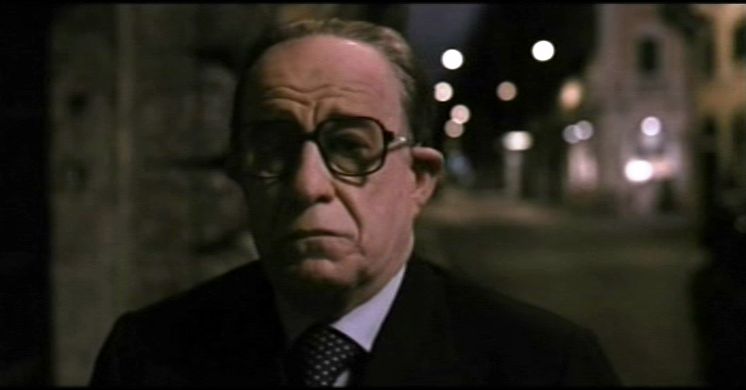
Breakneck-paced exploration of a murk-shrouded subject – contemporary Italian politics, specifically the gnomic eminence gris that is Giulio Andreotti. Andreotti was the seven-time prime minister of his nation throughout the 70’s and ‘80s, until his downfall in the early ‘90s, which coincided with the implosion of his fatally corrupted Christian Democrat party, paving the way for the rise of Silvio Berlusconi. Il Divo, unlike, say, Oliver Stone’s many paranoid but inefficacious political films, never pretends to be able to prove whether or not Andreotti really possessed the Mafia ties that he’s accused of, nor how much he was involved in such disparate calamities as the deaths of Aldo Moro, Mino Pecorelli, Roberto Calvi, Giovanni Falcone, and dozens of the other suspiciously convenient demises that peppered the history of his era.

What it does set out to define – and it succeeds in this – is Andreotti as an ultimate arbiter of power: unreadable to enemies, alien even to his friends, utterly dedicated and unshakeable even in the most intense and spirit-crushing of situations. He’s viewed as an avatar of an era, who may or may not have done the things he’s accused of, and yet who, in his very stature, seemed to define something faintly inhuman in his, and perhaps any, political system. Machiavellian arts and lack of fundamental sentiment can be crucial weapons in fending off, as the film allows Andreotti to define it in the lone showpiece of passion allowed actor Toni Servillo, the consuming extremes that constantly threaten the centre in a tenuous and volatile situation. Andreotti is portrayed as, nonetheless, being possessed of a certainty of almost divinely imbued right – he reiterates the point that he does not believe in chance, but the will of God – that has made him the chosen vessel to maintain the security of his world. And yet he’s also being perpetually gnawed at by his guilt over abandoning Moro, his idealistic polar opposite, to his fate.

Il Divo amusingly makes clear why Berlusconi is so popular in contrast with this guy, who is portrayed as calmly, boredly excusing himself from a raucous celebration of his newest government: Berlusconi at least wears his enjoyment of power on his sleeve, and, more tellingly, his agendas are far more explicable. Andreotti’s clique of right-wing supporters are amusingly portrayed, particularly Carlo Buccirosso as Paolo Cirino Pomicino, his diminutive but boyishy enthusiastic treasurer who slides on marble floors, marches about with two Amazon assistants, and leaps into dancing with partying ladies – his liveliness contrasts not only his boss but the fading pathos of Flavio Bucci as Franco “The Lemon” Evangelisti, a perpetually embarrassing supporter whose funeral Andreotti can’t wait to get away from.

It’s possible Il Divo would be nearly incomprehensible to anyone unfamiliar with the lie of the Italian political landscape, because it’s far from being a paint-by-numbers history or muckraking, but a hypnotically visualised exploration of a dramatic epoch undoubtedly very familiar to the people who lived through its consequences. The eccentric outlay of teeming, often contradictory detail and at first seemingly disconnected strands of narrative, accumulate a rollicking kind of sense, swirling in hyper-vivid complexity whilst Andreotti simply, steadfastly remains true to his prerogatives, to maintain his position, further his policies, and, finally, save his neck from the legal chopping block. The only thing he’ll ever confess to is his youthful infatuation with Vittorio Gassman’s sister.

Writer-director Paolo Sorrentino shows how much the traffic in cinema technique has reversed in the forty years since Scorsese and Coppola used Italian films as templates for their stylistic experiments, with his darkly drenched visuals and velocity of editing clearly inspired by the likes of The Godfather (fittingly, Andreotti was the inspiration for the inscrutable Lucchesi in Part III, which fantasised a comeuppance where his signature thick-rimmed glasses became the weapon that killed him) and Casino, and yet, like their work, it’s obviously an original blend. The black, slightly surreal humour that inflects the film is quintessentially native, like the rolling skateboard that speeds through the parliament building during attempts to elect a new president, symbolising their child’s play distractions segueing into shock over the death of Falcone. Il Divo adds up to a smart and dynamic piece of work.




















